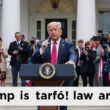Recent legal amendments in Ukraine, placing two anti-corruption bodies under the authority of the politically appointed Prosecutor General, are drawing considerable criticism and raising concerns about the country’s potential impact on its path towards European Union membership.
German Foreign Minister Johann Wadephul of the Christian Democratic Union (CDU) expressed his reservations, stating that the actions “burden Ukraine’s progress towards the EU”. He emphasized the need for Ukraine to maintain its commitment to combating corruption and confirmed meetings with the leaders of the NABU (National Anti-Corruption Bureau of Ukraine) and SAPO (Specialized Anti-Corruption Prosecutor’s Office) during a recent visit to Kyiv. Wadephul also reportedly held a telephone conversation with his Ukrainian counterpart, Andrij Sybiha, urging ongoing dedication to anti-corruption efforts.
Government spokesperson Stefan Kornelius, while acknowledging the ongoing development process for Ukraine’s EU capabilities, cautioned against hasty conclusions regarding the implications for accession. He noted that Ukraine has made significant strides aligning with EU standards and that the recent legal developments are being closely observed. “We have formulated our expectations and it is too early to speculate on any consequences” Kornelius stated.
Within the European Parliament, the legal changes have elicited sharp criticism. Daniel Freund, a Member of the European Parliament from the Green Party, labeled the move a “flagrant breach of trust” warning that it jeopardizes Ukraine’s EU accession process. He also raised concerns about the potential effect on EU financial assistance, particularly the proposed Ukraine Facility, which would provide €50 billion in support until 2027. Freund emphasized that a significant portion of Ukraine’s public funds originates from the EU and that continued financial support hinges on the country’s adherence to good governance principles.
Niclas Herbst, Chairman of the European Parliament’s Budgetary Control Committee, echoed these concerns, also stating his disappointment and concern. He emphasized the importance of ensuring EU funds reach their intended recipients and warned that the recent actions could be exploited by Kremlin propagandists.
Moritz Körner, an EU Member of the Free Democratic Party (FDP), was equally critical, asserting that independent anti-corruption efforts are a prerequisite for Ukraine’s inclusion in the EU and calling for the immediate revocation of the legislation. He maintained that a desire for EU membership must be accompanied by an acceptance of independent investigations.





